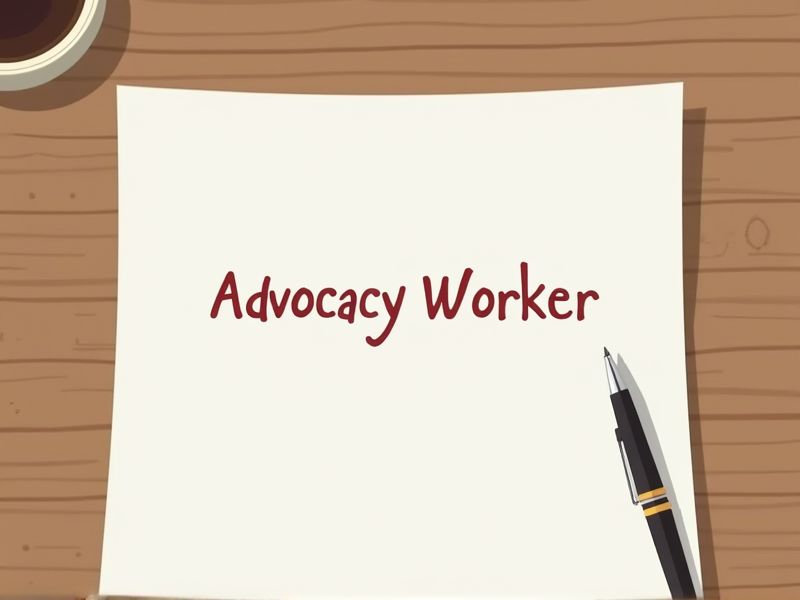
Advocacy workers often engage with vulnerable communities, requiring them to possess specialized skills and knowledge to support their clients effectively. Certifications ensure that advocacy workers understand legal requirements and ethical standards essential for their role. Proper qualifications assist in building credibility and trust with clients and stakeholders. Here are several key certifications beneficial for an advocacy worker.
Certified Advocacy Professional
A Certified Advocacy Professional provides standardized skills and competencies, enhancing the effectiveness of advocacy workers. Certification validates expertise, leading to increased trust from clients and stakeholders. Continuing education requirements ensure professionals stay updated with current practices and regulations. Employers gain confidence in the capabilities of certified individuals, potentially improving advocacy outcomes and resource allocation.
Social Work Advocacy Certification
Obtaining a Social Work Advocacy Certification equips advocacy workers with the skills and knowledge to effectively navigate complex systems. Certification enhances credibility, which can lead to increased trust from clients and stakeholders. The structured training it provides ensures that workers are updated on the latest legal and ethical standards. Certified advocates are often more successful in securing necessary resources and support for their clients.
Community Organizing Certificate
A Community Organizing Certificate equips advocacy workers with proven strategies for mobilizing grassroots support. It enhances their understanding of community dynamics, enabling effective engagement and issue-based campaigning. Certification also validates their expertise, increasing credibility among peers and stakeholders. Structured training improves organizational skills, essential for long-term impact and sustainability in advocacy efforts.
Civil Rights Advocacy Certification
Civil Rights Advocacy Certification equips advocacy workers with essential knowledge to navigate complex legal landscapes, enhancing their ability to protect individuals' rights. Certification ensures that workers remain current on laws and policies, leading to more effective advocacy strategies. Possessing such certification builds credibility and trust within communities, encouraging more individuals to seek assistance. Certified advocacy workers tend to achieve better outcomes due to structured training and understanding of civil rights issues.
Crisis Intervention Certification
Crisis Intervention Certification equips advocacy workers with essential skills to manage high-stress situations effectively, reducing the risk of escalation. This certification ensures workers are adept at facilitating communication and support, fostering better outcomes for individuals in crisis. Trained advocates can identify signs of distress earlier, leading to quicker, more appropriate interventions. Certification also enhances credibility and trustworthiness, which can increase the confidence of those seeking assistance during vulnerable times.
Trauma-Informed Care Certification
Advocacy workers often engage with individuals who have experienced trauma, and having a trauma-informed care certification equips them with the necessary skills to recognize and respond appropriately to such situations. This certification emphasizes understanding the impact of trauma on behavior and health, which enhances the ability of workers to provide effective support and communication. Training in trauma-informed care leads to creating safer environments for individuals, fostering trust and reducing retraumatization. Implementing trauma-informed practices improves service outcomes and supports the holistic healing process for those affected.
Mediation and Conflict Resolution Certification
Mediation and Conflict Resolution Certification equips advocacy workers with essential skills for effectively navigating disputes and fostering dialogue. This certification enhances their ability to manage conflicts, ensuring more constructive and peaceful resolutions. With advanced mediation techniques, advocacy workers are better prepared to facilitate understanding among diverse groups. As a result, the certification increases their credibility and effectiveness in community engagement and negotiation.
Diversity and Inclusion Certification
Diversity and Inclusion Certification equips advocacy workers with the necessary skills to effectively navigate and address the complex needs of diverse communities. Proficiency in these areas enhances the ability to create inclusive strategies that resonate with various cultural backgrounds. Equipped with this certification, advocacy workers are more adept at identifying and dismantling systemic biases within organizations. Knowledge acquired through such certification fosters an environment of empathy and respect, crucial for building trust and cooperation among community members.
Public Policy Advocacy Certification
Public policy advocacy certification equips advocacy workers with essential knowledge and skills to navigate complex legislative environments, enhancing their effectiveness in promoting specific causes. Policymakers often respond better to well-informed advocates, making certification a key tool in gaining their attention and trust. Certification can also provide a structured framework for understanding policy processes, allowing advocacy workers to craft strategic campaigns with measurable outcomes. This enhances their credibility, potentially opening doors to more influential positions within advocacy organizations or partnerships.
Grant Writing Certification
Grant writing certification equips advocacy workers with the skills to effectively communicate their organization's mission and funding needs. Proficiency in grant writing enhances the likelihood of securing funds essential for program development and sustainability. Certification also demonstrates a worker's credibility and commitment to professional growth. These factors strengthen advocacy efforts, leading to more robust community impact.
Summary
When you obtain certifications as an Advocacy Worker, you can expect enhanced trust and credibility in your interactions with clients and organizations. These credentials often lead to increased career opportunities and greater job stability due to recognized expertise. Certified Advocacy Workers typically report improved skills, which translates into more effective advocacy and support for their clients. As a result, the organizations or individuals you work with may experience better outcomes and satisfaction, reflecting your refined competence.
